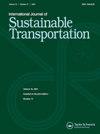Costs and carbon: Evaluating the tradeoffs in Taiwan’s shift toward electric vehicles
IF 3.9
3区 工程技术
Q2 ENVIRONMENTAL STUDIES
International Journal of Sustainable Transportation
Pub Date : 2025-04-03
DOI:10.1080/15568318.2025.2490488
引用次数: 0
Abstract
Battery Electric Vehicles (BEVs) are pivotal in advancing sustainable mobility and addressing climate change globally. An increasing number of regions, including Taiwan, are implementing plans to phase out the sale of Internal Combustion Engine Vehicles (ICEVs). In Taiwan, where the transportation sector contributes 13% of fossil carbon emissions, nearly half attributed to passenger vehicles, electrification is key to achieving net-zero emissions. This study provides a comprehensive life cycle assessment (LCA) and total cost of ownership (TCO) analysis of 182 vehicle models, including ICEVs, Hybrid Electric Vehicles (HEVs), and BEVs. Our findings reveal that BEVs reduce total CO2 emissions by an average of 20% compared to ICEVs, largely due to decreased emissions from electricity generation and reduced fuel consumption. Although BEVs initially present double the purchase costs of ICEVs, their long-term economic competitiveness is enhanced by lower operational and maintenance costs. Nevertheless, the environmental impact of BEVs depends heavily on the decarbonization of the power grid, and the prevalence of expensive imported BEVs challenges their adoption. This study highlights the necessity for specific policies, such as financial incentives, support for domestic BEV production, and accelerated grid decarbonization, to enhance BEV adoption in Taiwan. Such measures, coupled with increased public awareness, are crucial to ensuring Taiwan’s vehicle electrification aligns with its ambitious 2050 net-zero emission goals.
成本与碳排放:台湾转向电动汽车的权衡评估
纯电动汽车(bev)在推进可持续交通和应对全球气候变化方面发挥着关键作用。包括台湾在内,越来越多的地区正在实施逐步淘汰内燃机汽车(icev)销售的计划。在台湾,交通运输部门贡献了13%的化石碳排放,其中近一半来自乘用车,电气化是实现净零排放的关键。本研究对182种车型进行了全面的生命周期评估(LCA)和总拥有成本(TCO)分析,包括纯电动汽车、混合动力汽车(hev)和纯电动汽车(bev)。我们的研究结果显示,与电动汽车相比,纯电动汽车的二氧化碳总排放量平均减少了20%,这主要是由于发电过程中的排放减少和燃料消耗减少。虽然纯电动汽车最初的购买成本是电动汽车的两倍,但其长期的经济竞争力因其较低的运营和维护成本而增强。然而,电动汽车对环境的影响在很大程度上取决于电网的脱碳,而昂贵的进口电动汽车的普及挑战了它们的采用。本研究强调台湾有必要采取具体政策,如财政激励、支持国内纯电动汽车生产、加速电网脱碳等,以提高纯电动汽车的普及率。这些措施,加上公众意识的提高,对于确保台湾的汽车电气化符合其雄心勃勃的2050年净零排放目标至关重要。
本文章由计算机程序翻译,如有差异,请以英文原文为准。
求助全文
约1分钟内获得全文
求助全文
来源期刊
CiteScore
8.90
自引率
2.60%
发文量
56
期刊介绍:
The International Journal of Sustainable Transportation provides a discussion forum for the exchange of new and innovative ideas on sustainable transportation research in the context of environmental, economical, social, and engineering aspects, as well as current and future interactions of transportation systems and other urban subsystems. The scope includes the examination of overall sustainability of any transportation system, including its infrastructure, vehicle, operation, and maintenance; the integration of social science disciplines, engineering, and information technology with transportation; the understanding of the comparative aspects of different transportation systems from a global perspective; qualitative and quantitative transportation studies; and case studies, surveys, and expository papers in an international or local context. Equal emphasis is placed on the problems of sustainable transportation that are associated with passenger and freight transportation modes in both industrialized and non-industrialized areas. All submitted manuscripts are subject to initial evaluation by the Editors and, if found suitable for further consideration, to peer review by independent, anonymous expert reviewers. All peer review is single-blind. Submissions are made online via ScholarOne Manuscripts.

 求助内容:
求助内容: 应助结果提醒方式:
应助结果提醒方式:


